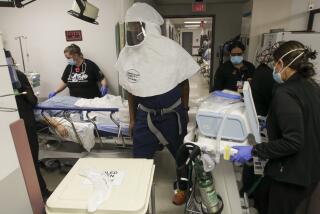Panel Criticizes Doctors Who Won’t Treat AIDS : Health: U.S. report says a ‘shocking’ number avoid the disease. It terms that attitude unacceptable.
- Share via
WASHINGTON — The National AIDS Commission said Tuesday that a “shocking” number of physicians and other health care professionals across the nation are still refusing to care for AIDS patients.
“It can no longer be acceptable for a physician or a dentist to offer as an excuse: ‘I don’t have expertise in relation to this particular disease,’ ” the panel declared, noting that an estimated 1 million Americans are infected with the human immunodeficiency virus. “They simply must acquire the expertise.”
In issuing its third interim report to President Bush, the commission said “it is clear . . . that effective AIDS education programs are needed for all health care workers,” including programs for those already in practice as well as those still in training.
“We must support and (reinforce) those who have chosen to provide the care and services needed over the last decade to people living with HIV infection and AIDS,” the panel said.
“Caring for people with HIV infection and AIDS will challenge health care providers to overcome their fears, ignorance and prejudices,” the commission added. “For many, this will not be easy.”
Immediate action is needed, the panel said, to enhance “all programs designed to educate . . . practicing health care professionals and to create incentives for providers to care for people in underserved areas.”
The commission is an independent body established by Congress to advise lawmakers and the President on how to develop “a national consensus on policy” for the AIDS epidemic. In two earlier reports, it assessed the response of the health care system to the growing AIDS caseload and the need to target additional funds to cities and states hardest hit by the epidemic.
In its latest report, the commission criticized the federal AIDS research effort, saying that too few women, children and minority members have been included in clinical trials of experimental AIDS therapies.
In addition, the panel said there has been too little research directed at the opportunistic infections that afflict many patients with weakened immune systems, “even though they are usually the cause of death for people with AIDS.”
The National Institutes of Health recently announced that it will increase its opportunistic-infections work and make a greater effort to expand studies to include previously under-represented groups.
The commission said also that many areas of rural America are still ill-equipped to cope with the AIDS epidemic, and it proposed expanding education and outreach services in those communities before they are “blindsided.”
Dr. June Osborn, commission chairman, said that the reluctance of some health care workers to treat AIDS patients is based on the fear of infection as well as “what people presume has put one in the path of HIV,” meaning sexual orientation and intravenous drug use.
“The mix of phobias is what’s doing it,” she said.
So far, 37 health care workers are known to have been infected through occupational exposure, according to the federal Centers for Disease Control. CDC officials, however, have said the true figure is probably higher.
Dr. M. Roy Schwarz, senior vice president for medical education and science for the American Medical Assn., said the AMA has taken the position that doctors ethically may not refuse to care for AIDS patients.
Schwarz added, however, that he believes physicians are entitled to know in advance if their patients are infected.
“I think the ethics are clear,” he said. “Doctors are supposed to treat. They’re supposed to educate themselves so they can treat. And they live with the fears. But they are entitled to some protections, one of the protections being full knowledge of what they’re dealing with.”
AMA policy further states that is in the “best interest” of the patient for the doctor to “focus on treatment of the disease, rather than on making value judgments about how the disease was contracted.”
Nevertheless, Gordon Nary, executive director of the Physicians Assn. for AIDS Care, whose 600 members have cared for about 54,000 people with AIDS or AIDS-related complex, said “judgmentalism” is the reason many health professionals are unwilling to care for AIDS patients.
“We got a call last week from a woman whose brother’s physician told her: ‘Your brother was out partying and deserves what he got, and there’s nothing more we can do for him” Nary said. “ . . . Patients have been blamed by their physicians.”
However, Nary said he considered it wrong to “insist that every physician take care of a new patient he does not want to take care of.”
More to Read
Sign up for Essential California
The most important California stories and recommendations in your inbox every morning.
You may occasionally receive promotional content from the Los Angeles Times.













